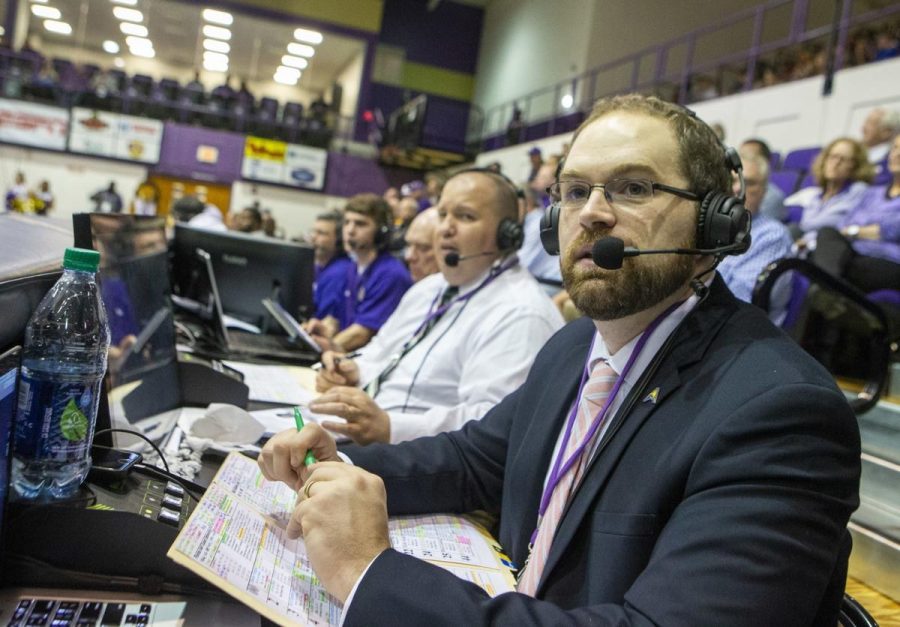College commentary: more than just the game
Benjamin Ray is the play-by-play commentator for seven UNA sports. Ray’s job is to tell the stories of student athletes.
August 20, 2021
Benjamin Ray becomes immersed in a game as soon as his headset goes on.
Ray, a Florence native and University of North Alabama alumnus, serves as the Coordinator of Creative Broadcasting Content and Special Assistant to the Athletic Director for UNA and works play-by-play commentary for UNA’s athletic programs.
“I love doing the research,” Ray said. “I love learning so much about our student athletes and having that responsibility to tell their story.”
Outside of commentary, Ray also covers interviews and promotions of soccer, tennis, volleyball, football, men’s and women’s basketball, baseball and softball. He is the creator of Lion Vision Updates, a weekly show that helps to promote UNA athletic programs and give viewers an inside look at coaches and players’ thoughts. Ray also covers pregame, halftime and post-game coverage for all seven sports.
“I love doing all of that, but nothing replaces games,” Ray said. “The games are why we do this,”
Ray said that his favorite sport to cover is whichever one is in season. Still, Ray acknowledges that baseball can be the most challenging, yet rewarding to cover.
“How many different ways can you describe a ground ball to second base?” Ray said. “You’ve got 30 or 45 seconds between pitches. It’s a challenge, but a fun challenge.”
Basketball has its own challenges.
Ray said that in basketball, a commentator may not get to tell every story they want due to the constant motion of the game. Despite these challenges, Ray finds himself immersed in the game as soon as the headset goes on.
“Broadcasting is the easy part,” Ray said. “The research is where the real work is done.”
Out of all of the games, football takes the most amount of research; Ray equates it to about 40 hours of work per game.
Ray said he never has enough time to do the most possible research for any one game.
“I’m always looking for little nuggets to toss out there,” Ray said. “I want people to listen and say, ‘Oh I didn’t know that.’ The amount of research you do can make the broadcast even easier. Sometimes the game will not allow commentators a chance to use all their research, but if you are able to use those ‘little nuggets,’ it makes the broadcast that much better.”
Ray credits his background in sports information to his love for research prior to games.
During his time at UNA from 2007-2012, Ray worked in the sports information department while attaining his degree in sports management. After graduating, Jeff Hodges, Senior Associate Athletic Director for Communications, advised him of Jacksonville State University’s (JSU) need for Graduate Assistants.
“Jeff Hodges opened up a door for me and my time here at UNA paid off and made that connection,” Ray said.
As a Graduate Assistant at JSU from 2012-2014, Ray worked 40 hours in the office and at events, which gave him great hands-on experience in the field of sports while paying for his master’s degree.
Ray credits Josh Underwood, Associate AD for Media Relations at JSU, for showing him how to succeed in the business.
“Josh Underwood took me under his wing and really showed me so much in terms of how the business works, how to write articles and how to just be a professional,” Ray said.
At JSU, Ray worked every weekend looking for any and every opportunity to network and get experience. In 2013, an opportunity arose to volunteer at the NCAA Men’s Golf Championship hosted at Georgia Tech. There, Ray took quotes and helped run the media center while making connections.
Throughout his time at JSU, Ray also volunteered at Talladega Super Speedway on race days and volunteered at the 2014 NCAA Women’s Final Four in the Ohio Valley Conference. At these events, Ray had the opportunity to interview players and coaches while also writing press releases and helping to run the press room.
In addition to this, Ray also worked all the football and basketball events for the Alabama High school Athletic Association Championship Events.
“It was all just such a great experience getting to work so many events,” Ray said. “I think that’s the big thing in this industry, just getting out and working.”
After JSU, Ray moved back to Florence, turning down three job offers in hopes of working in broadcasting. It did not take long for Kevin Johnson, the Florence High School radio broadcaster at the time, to call Ray, requesting a sideline reporter.
Soon, doors began to open. A week after Johnson’s call, UNA also got in touch with Ray requesting him as a sideline reporter, to which he accepted.
“One thing I’ve learned is that you can’t ever say no,” Ray said. “You’ve got to take every opportunity you can get. I remember standing out on the sidelines for Florence and UNA just staring up at the press box and thinking ‘man I want to get in that broadcast booth.’”
A year later in January of 2015, Ray joined Matthew Suleski, Sports Radio Host/Broadcaster, at Big River Broadcasting on WSBM 97.9 for ‘Matt and Ben in the Morning.’ The show covered local national and regional sports from 6 a.m. to 8 a.m.
Ray said that the morning show taught him how to be on-air and how to fill a two-hour segment.
“You don’t realize how hard that is until you do it,” Ray said. “You give an opinion, and you look at the clock and man, that’s only 60 seconds. It presented a lot of great challenges. I will always be thankful to… everybody at Big River who gave me that opportunity.”
In June of 2015, Ray joined the UNA staff as Athletics Ticket Manager and Corporate Sales Coordinator. Later in 2016, Ray was promoted to Director of Ticketing and Marketing for UNA, where he continued with the ticket office, marketing and corporate sales which began to open opportunities in broadcasting.
Ray’s journey to broadcasting led him to his current position of Coordinator of Creative Broadcasting Content and Special Assistant to the Athletic Director for UNA.
“This is what I wanted to do when I left Jacksonville State,” Ray said. “I wanted to be in this position working in the broadcasting department interviewing coaches, student athletes telling their stories. It’s what I set out to do and it’s nice to finally be in that position.”
Bryan Neece, UNA’s Color Commentator for football, has covered football with Ray since 2018. Neece’s job is to provide the audience with enthusiastic coverage.
“You can make a broadcast as boring or as exciting as you want to as far as color commentary goes,” Neece said. “[Color commentators] can light up a broadcast.”
Neece said that when watching sporting events, he tends to listen to what the color commentator has to say, learning from other commentators such as ESPN’s College Game Day color commentator, Kirk Herbstreit.
Like Ray, Neece said, although game-day is most enjoyable he too enjoys the research and preparation for games.
“I enjoy talking to the opponents’ broadcasters and finding out who we are lining up against,” Neece said.
Ray and Neece have been working together for three years now and both have some of the same thoughts on commentary preparation and game day broadcasts.
“It’s been great to work with Ben,” Neece said. “[Ever] since day one, we clicked pretty often and sometimes you just don’t get that with broadcasters in the booth. We kind of know where each other are going now. We’ve done it with baseball, basketball and football. Ben as the play-by-play kind of takes the lead there, but I’ve got a pretty good feel for what he’s trying to get across to the listener.”
Neece’s advice for those entering the field of commentating is to enjoy the preparation. To him, the days leading up to a game are the biggest part of a broadcast.
“If you don’t enjoy the process of learning about the other team, and your team too, then it’s probably not the field you want to be in because it is a lot of preparation,” Neece said.
Ultimately, like most jobs it comes down to experience.
Ray said those interested in commentating have got to get “reps.”
“You’ve got to put the headset on,” Ray said. “You’ve got to work on the sidelines and never say no to an opportunity to get on air.”
Ray invites students to get involved in athletics if they are thinking about broadcasting.
“We’ve got a broadcast department that’s doing 100 events a year, from ESPN to radio and if you want to get experience in production, if you want to get experience on air, there are tons of opportunities,” Ray said. “We just encourage students to look us up and come get involved.”



